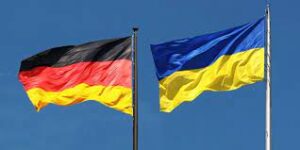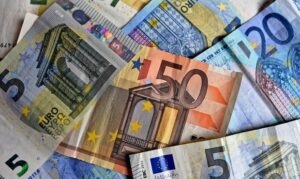
Germany is sending equipment and weapons to Ukraine: the new military aid package includes 14,000 rounds of 155 mm artillery ammunition, 4 WISENT 1 demining vehicles, 3 mobile remote-controlled and protected demining systems, and 250 demining kits, the German government website reported on Monday.
According to the published updated list of military aid delivered to Ukraine, it also includes 10 Vector reconnaissance UAVs with spare parts; 22 anti-drone systems; 12 SatCom terminals; 4 vehicles for border guards; and materials for the disposal of explosive ordnance;
The package was provided by the resources of the Federal Armed Forces and government-funded industry.
It is noted that about 5 billion euros (2023) and about 1.6 billion euros (2022) have already been spent on military assistance to Ukraine. An additional 2.9 billion euros were allocated in the first two years of the war for aid that will be received only in 2025-2028.
In total, since February 24, 2022, Germany has supplied materials from the Federal Armed Forces’ stockpiles worth approximately €5.2 billion. In addition, more than 10,000 Ukrainian soldiers have received military training in Germany. The cost of this training is currently about €282 million.

The German economy may enter recession in the first quarter of 2024, the Bundesbank said in its monthly report. According to the German central bank, the country’s GDP is likely to decline slightly again in January-March.
It contracted by 0.3% in quarterly terms in the fourth quarter of 2023, according to preliminary data from the German Federal Statistical Office (Destatis). The final data will be presented on Friday.
As negative factors for the German economy, the Bundesbank notes a significant decline in demand for industrial exports, the likely continued restraint of consumers in spending, increased uncertainty about climate policy, a decrease in order books in industry and construction, as well as strikes, including in rail transport and aviation.

Germany will provide military aid to Ukraine in the amount of EUR7.1 billion in 2024, including a EUR1.1 billion aid package, German Chancellor Olaf Scholz said at a press conference in Berlin on Friday.
“In total, Germany has allocated or committed EUR28 billion for military aid,” he added.
Today, Scholz noted, “we are preparing a new level – EUR 1.1 billion. This includes 36 armored howitzers and wheeled howitzers from industrial stocks, 120 thousand pieces of ammunition, as well as two Skynex systems and missiles for IRIS-T,” Scholz said.
According to him, the signed agreement on military cooperation establishes that Germany will continue to support an independent Ukraine that is defending itself against Russian aggression.
Germany, Scholz said, “will support Ukrainian partners in building modern, defensible armed forces in order to prevent any future Russian aggression.” According to him, “today’s agreement also covers assistance in the civilian sphere, such as demining, energy infrastructure in Ukraine and reconstruction.”
In turn, Scholz noted, Ukraine assumes responsibility for continuing reforms leading to the country’s accession to the EU. “I have to be clear: of course, we all want this war to end as soon as possible. But, unfortunately, we see that Russia is not ready for a lasting and just peace,” the Chancellor said.
He also appealed to the US Congress to “make the decisions that Ukraine needs now to provide financial and military support.”
According to the website of the German Ministry of Defense, on Friday the federal government prepared another package of military support for Ukraine worth EUR1.13 billion.
It includes 18 Panzerhaubitzen-2000 self-propelled howitzers (to be delivered in 2026-2027, including training, spare parts and ammunition, in addition to the 14 already planned), 18 RCH 155 wheeled howitzers (to be delivered in 2025-2027 in addition to the 18 planned), 120,000 rounds of 122 mm artillery ammunition (to be delivered in 2024), a second SkyNex air defense system (to be delivered in 2025), and 100 more IRIS-T SLS missiles (in addition to the previously planned).
“Our Security Agreement with Ukraine is historic. For the first time in its history, the Federal Republic acts as a guarantor state. Today’s signing is a clear sign that Germany is fulfilling its increased security commitments in Europe. Our “Munich package” worth more than EUR 1 billion confirms our ongoing military support for Ukraine and shows that we are fulfilling our promise to stand by our Ukrainian partners in their fight against Russian aggression,” said German Defense Minister Boris Pistorius.

An important part of the Ukraine Recovery Conference 2024 (URC2024) in Berlin on June 11-12 this year will be a professional recovery forum aimed at achieving a concrete result in establishing contacts between Ukrainian, German and international stakeholders, German Development Minister Svenja Schulze said.
“This is not an idle conference, we would like to create a business development fund with systemic financial instruments to support, for example, small and medium-sized businesses or to support local reconstruction,” she said at a roundtable discussion on Ukraine’s reconstruction at the Munich Security Conference.
Schulze also noted the intention to create a center to provide municipalities with the information, funding and training services they need.
She said the role of municipalities will be one of the four main topics that will be the focus of URC2024, along with the role of the private sector and private investors, the EU accession process and the reforms needed for it, and the topic of human capital and social recovery.
“We need to mobilize the private sector. This is really important. Not enough public money? – We also need private money. We have local and regional requirements: municipalities and regions need to be part of this process and they need to help drive it forward,” explained the German Development Minister.
According to her, all these topics at the Recovery Conference will also be permeated by the common theme of digitalization, in which Ukraine has already achieved impressive results.
business development funds, GERMANY, municipalities assistance center

Germany has handed over a new military aid package to Ukraine, which includes a new Skynex anti-aircraft artillery system and ammunition, the German government’s press service reports.
In addition, ammunition for the Patriot and IRIS-T SLM systems, as well as for Leorard 2A6 tanks, was transferred.
The aid package also includes 10 Marder infantry fighting vehicles, 2 TRML-4D radars, 9,080 rounds of 155 mm ammunition, 2 WISENT demining tanks, 1 Biber bridge-building tank, 3,350 combat helmets, and 30 drone detection systems, 10 GO1 ground surveillance radars, 10 Zetros trucks, 3 8×8 HX81 tractors and a semi-trailer, 34 other vehicles, 305 MK 556 assault rifles, 0.75 million rounds of ammunition and 1152 winter camouflage nets.
In the future, it is also planned to transfer 4 IRIS-T SLM anti-aircraft missile systems, 1 more Skynex air defense system with ammunition, 20 drone detection systems, 26,850 combat helmets, 41 Mercedes trucks, 4,695 MK 556 assault rifles, 0.45 million rounds of ammunition for firearms and 8,000 anti-tank mines.

High interest rates and the termination of large-scale government assistance provided to companies during the COVID-19 pandemic have hit businesses in most developed economies hard, resulting in double-digit bankruptcy growth rates, the Financial Times reports.
Thus, the number of corporate bankruptcies in the United States for the fiscal year ended September 30 increased by 30% compared to the same period a year earlier.
In Germany, which is the largest economy in Europe, the number of bankrupt companies increased by 25% in January-September. Since June, double-digit growth rates have been recorded every month, the country’s statistical office said.
According to the EU statistics agency, the number of insolvent companies in the community countries increased by 13% in January-September and reached the highest level in eight years. In France, the Netherlands, and Japan, the number of bankruptcies in October increased by more than 30% year-on-year. In England and Wales, the insolvency rate in January-September reached its highest level since 2009.
The Organization for Economic Cooperation and Development recently reported that in a number of countries, including the Nordic countries of Denmark, Sweden and Finland, the number of corporate bankruptcies has exceeded the levels of the global financial crisis of 2008-2009.
The main negative factors are “the cost of debt servicing and the withdrawal of pandemic support, as well as high energy bills, especially in energy-intensive sectors,” according to Capital Economics Chief Economist Neil Shearing.
According to analysts, most bankruptcies were recorded in the transportation and hospitality industries.
Shearing warned that the trend of deteriorating solvency of companies will continue, as many businesses will have to refinance their debt at higher rates in the coming months, even though central banks are expected to have already reached their peak.
The surge in bankruptcies will put pressure on global economic activity and job growth over the next few years, experts say.
The international rating agency Moody’s expects the number of defaults of companies with speculative grade ratings in the world to continue to grow in 2024 after it already exceeded the average for recent years in October.
German insurer Allianz predicts that the global insolvency rate will reach 10% next year, up from 6% in 2023. The hospitality, transportation and retail sectors will be most affected.
“We are seeing an increase in corporate bankruptcies in almost all countries,” said Maxim Lemerl, a leading analyst at Allianz Research.